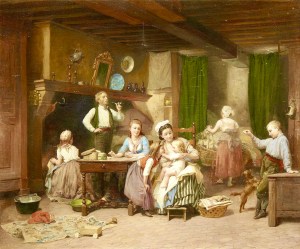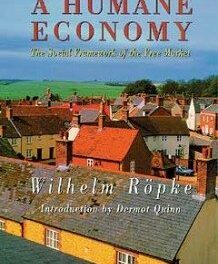We support our Publishers and Content Creators. You can view this story on their website by CLICKING HERE.
How do we redeem the time? We start by “brightening the corner where we are.”
 With the Louisiana Purchase, the original republican himself, Thomas Jefferson politically succumbed to the impulse to expand the nation and inflate the desires of a restless people. The modern American identity has become synonymous with expansion, with inflationary expectations, where a wise understanding of limitation, or “inner-check,” has become anathema. Richard Weaver called this “the spoiled-child psychology,” the belief of the mass man that “there is nothing that he cannot know… and there is nothing that he cannot have.”
With the Louisiana Purchase, the original republican himself, Thomas Jefferson politically succumbed to the impulse to expand the nation and inflate the desires of a restless people. The modern American identity has become synonymous with expansion, with inflationary expectations, where a wise understanding of limitation, or “inner-check,” has become anathema. Richard Weaver called this “the spoiled-child psychology,” the belief of the mass man that “there is nothing that he cannot know… and there is nothing that he cannot have.”
In this decadent world, order is not transcendent, it is not the result of the great work of time, but is rather the ephemeral result of the consumption faculty. “We have given them a technique of acquisition,” wrote Weaver, “how much comfort can we take in the way they employ it?” Imaginative conservatives in the school of Kirk take long views, and, as Dr. Kirk often reminded us, religion and ethics trump politics. Nevertheless, it is easy to understand why many of us grieve the passing of the old Republic. As John Randolph defined it–and where Dr. Kirk began his foray into historical scholarship–republican principles meant “love of peace, hatred of offensive war; jealousy of the State Governments towards the General Government, and the influence of the Executive Government over the co-ordinate branches of that Government; a dread of standing armies; a loathing of public debt, taxes, and excises; tenderness for the liberty of the citizen; jealousy, Argus-eyed jealousy, of the patronage of the President….”
As conservatives–as teachers–we must stand with the philosophers and the theologians against the sophists and keep asking, “to what end?” Kirk urged us to look deeper than politics, to take long views, to seek out clearer distinctions, and to flesh out a deeper understanding.
How do we redeem the time? We start by “brightening the corner where we are,” by improving ourselves, by helping our neighbors, by loving our families, by setting high standards for our students, and by exercising the inherited liberty bequeathed to us from the founders, responsibly, yet joyfully. “Freedom is something that gathers around the hearth, inheres in local associations, and endears to a man his place of habitation. It was a protection to enable him to enjoy things, not a force or power to enable him to do things,” wrote Weaver. And always reflect upon and advocate the permanent things.
This essay was first published here in July 2010.
The Imaginative Conservative applies the principle of appreciation to the discussion of culture and politics—we approach dialogue with magnanimity rather than with mere civility. Will you help us remain a refreshing oasis in the increasingly contentious arena of modern discourse? Please consider donating now.
The featured image is “Family Time” (1876) by Charles Auguste Romain Lobbedez, and is in the public domain, courtesy of Wikimedia Commons.
Share This Story, Choose Your Platform!
Go to Top

 Conservative
Conservative  Search
Search Trending
Trending Current News
Current News 






